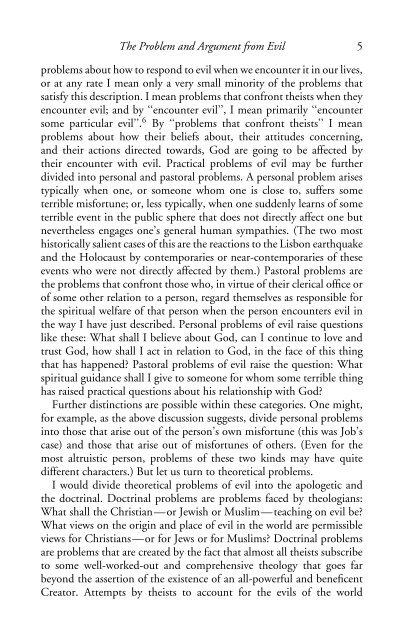The Problem of Evil - Common Sense Atheism
The Problem of Evil - Common Sense Atheism
The Problem of Evil - Common Sense Atheism
You also want an ePaper? Increase the reach of your titles
YUMPU automatically turns print PDFs into web optimized ePapers that Google loves.
<strong>The</strong> <strong>Problem</strong> and Argument from <strong>Evil</strong> 5<br />
problems about how to respond to evil when we encounter it in our lives,<br />
or at any rate I mean only a very small minority <strong>of</strong> the problems that<br />
satisfy this description. I mean problems that confront theists when they<br />
encounter evil; and by ‘‘encounter evil’’, I mean primarily ‘‘encounter<br />
some particular evil’’. 6 By ‘‘problems that confront theists’’ I mean<br />
problems about how their beliefs about, their attitudes concerning,<br />
and their actions directed towards, God are going to be affected by<br />
their encounter with evil. Practical problems <strong>of</strong> evil may be further<br />
divided into personal and pastoral problems. A personal problem arises<br />
typically when one, or someone whom one is close to, suffers some<br />
terrible misfortune; or, less typically, when one suddenly learns <strong>of</strong> some<br />
terrible event in the public sphere that does not directly affect one but<br />
nevertheless engages one’s general human sympathies. (<strong>The</strong> two most<br />
historically salient cases <strong>of</strong> this are the reactions to the Lisbon earthquake<br />
and the Holocaust by contemporaries or near-contemporaries <strong>of</strong> these<br />
events who were not directly affected by them.) Pastoral problems are<br />
the problems that confront those who, in virtue <strong>of</strong> their clerical <strong>of</strong>fice or<br />
<strong>of</strong> some other relation to a person, regard themselves as responsible for<br />
the spiritual welfare <strong>of</strong> that person when the person encounters evil in<br />
the way I have just described. Personal problems <strong>of</strong> evil raise questions<br />
like these: What shall I believe about God, can I continue to love and<br />
trust God, how shall I act in relation to God, in the face <strong>of</strong> this thing<br />
that has happened? Pastoral problems <strong>of</strong> evil raise the question: What<br />
spiritual guidance shall I give to someone for whom some terrible thing<br />
has raised practical questions about his relationship with God?<br />
Further distinctions are possible within these categories. One might,<br />
for example, as the above discussion suggests, divide personal problems<br />
into those that arise out <strong>of</strong> the person’s own misfortune (this was Job’s<br />
case) and those that arise out <strong>of</strong> misfortunes <strong>of</strong> others. (Even for the<br />
most altruistic person, problems <strong>of</strong> these two kinds may have quite<br />
different characters.) But let us turn to theoretical problems.<br />
I would divide theoretical problems <strong>of</strong> evil into the apologetic and<br />
the doctrinal. Doctrinal problems are problems faced by theologians:<br />
What shall the Christian—or Jewish or Muslim—teaching on evil be?<br />
What views on the origin and place <strong>of</strong> evil in the world are permissible<br />
views for Christians—or for Jews or for Muslims? Doctrinal problems<br />
are problems that are created by the fact that almost all theists subscribe<br />
to some well-worked-out and comprehensive theology that goes far<br />
beyond the assertion <strong>of</strong> the existence <strong>of</strong> an all-powerful and beneficent<br />
Creator. Attempts by theists to account for the evils <strong>of</strong> the world
















